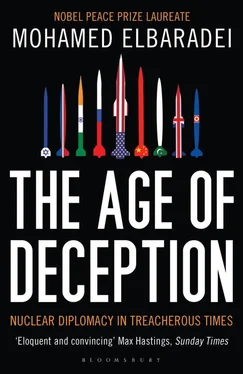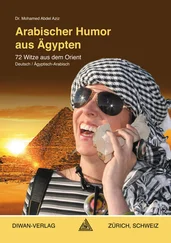I shared my views candidly. “Nuclear deterrence is not going to work for you in the long run,” I said, noting the relentless spread of nuclear technology and the efforts by sophisticated terrorist groups to acquire nuclear weapons. No nuclear arsenal would serve as a deterrent against such groups.
Furthermore, Israel’s refusal to talk seriously to Arab countries about the possibility of working toward a nuclear-weapons-free Middle East and about its own well-known but unacknowledged nuclear arsenal, fostered cynicism, anger, and a sense of humiliation across the region. In fact, the situation threatened the legitimacy of the overall nuclear nonproliferation regime in the eyes of the Arab public. Israel’s argument—that because of its perceptions of threats to its existence, it could not give up its nuclear weapons before reaching a comprehensive peace with the Arab and Muslim world—did not wash with this audience. Israel’s arsenal was seen by Arabs and Muslims as further emboldening Israel to ride roughshod over the rights of the Palestinians. If Iran were to leave the NPT, there would likely be overwhelming support from the Muslim world, which would see an Iranian nuclear weapon program as a way of establishing parity with Israel.
Our discussion was substantive, and Sharon listened carefully. He referred from time to time to the briefs prepared by his aides, and his responses were thoughtful and informed. Although the conversation was serious, it was infused with self-deprecating humor and punctuated by irreverent interruptions to Sharon from his advisers.
By the end of the meeting, Sharon had made a commitment, in the context of the Israeli-Arab peace process, to be ready to talk about the establishment of a nuclear-weapon-free zone in the Middle East. This was the first time an Israeli official had ever made such a statement. On previous occasions, the Israelis had repeated their position that any talks about a NWFZ would take place only after a comprehensive peace agreement. Israel had hardened its stance on nuclear discussions during the multilateral talks that began in Madrid in 1991. As a result, Egypt and the other Arab countries had decided to suspend all multilateral discussions, including arms control, resulting in the ultimate collapse of the Madrid process. Sharon’s shift in position, I believe, signaled an awareness of the growing anger and radicalization in the Arab world and of the prospects of an extremist group acquiring a nuclear weapon, and perhaps was an effort to show some flexibility on Israel’s part. More important, it was also prompted by growing fear of the Iranian nuclear program.
At the end of the meeting, Sharon said, “I heard you like jazz.” Smiling, he handed me a small gift, a CD by an Israeli group.
Some of those present at the meeting later tried to tone down what Sharon had told me. I assured them that I had heard clearly and that I would report to the IAEA Board what he had said.
My trip drew heavy criticism in the Egyptian and other Arab media because my agenda had not included inspection of Israel’s Dimona nuclear facility. I found myself accused of succumbing to U.S. influence. As the Arab media well knew, the IAEA had no authority to carry out such an inspection. They must have known that I had gone to Israel at the specific request of Agency Member States, including the Arab States. These facts were ignored in the Arab media, which in turn misled Arab public opinion. In any case, for the common person, legal nuances were trumped by the glaring reality of Israel’s nuclear arsenal. Although that arsenal was a source of great apprehension to Israel’s neighbors as a glaring regional security imbalance, the international community chose to turn a blind eye; yet it had gone to war in Iraq over fictional WMD claims and was sanctioning Iran for even attempting to acquire advanced nuclear technology. To the Arab Muslim world, the treatment of Israel’s nuclear program constituted a staggering double standard, explainable only as an arbitrary distinction between “good guys” and “bad guys.”
For some years I had argued that the international community should adopt a new approach in dealing with Israel, India, and Pakistan—the three countries that had never joined the NPT—and engage them as nuclear partners rather than pariahs. They had not violated any agreement by going nuclear. But more important, no arms control negotiations, I felt, could make headway without the participation of all the states possessing nuclear weapons. A nuclear-weapon-free zone in the Middle East, for example, could not be achieved without the engagement of Israel.
In 2006, in keeping with this pragmatic approach, I endorsed the agreement between India and the United States for the two countries to pursue civil nuclear cooperation—meaning nuclear power reactor technology, nuclear safety practices, and other peaceful nuclear applications. For this I drew the ire of U.S. experts and former government officials who had been working in the field of nuclear arms control for many years and who generally were very supportive when I spoke out on disarmament issues. Now they were enraged, charging me with “undermining the NPT” and “taking the side of the Bush administration.” They were joined in their criticism by a few officials from other governments.
The history of India’s nuclear weapon program was unique. J. N. Dixit, India’s late national security adviser, told me that in the early 1960s, before the NPT was finalized, U.S. secretary of state Dean Rusk encouraged Prime Minister Nehru to lead India’s development of a nuclear weapon. This reflected the U.S. desire for India to balance the emergence of China as a nuclear-weapon state.
Nehru had refused: India would remain an outspoken advocate of nuclear disarmament. But mindful of its perceived regional security risks, India also declined to join the NPT, thus retaining the nuclear weapons option as a future possibility.
Ten years after Nehru’s death, India demonstrated, with its “peaceful nuclear explosion” in 1974—code-named Smiling Buddha—that it had mastered the technology. But India continued to exercise restraint. In 1988, Prime Minister Rajiv Gandhi submitted to the UN General Assembly an “Action Plan Ushering in a Nuclear-Weapon Free and Non-Violent World Order.” Only after decades of watching China grow in power and prestige as a nuclear-weapon state, with every technology made available, while India was treated with benign neglect, subject to export restrictions on sensitive technologies, did the Indian government decide to go nuclear. A series of nuclear weapon tests were conducted in 1998, and India declared itself a nuclear-weapon state.
The deal initiated by Indian prime minister Manmohan Singh and U.S. president George Bush in 2005 acknowledged a practical reality: India had long been a possessor of nuclear weapons, and an ongoing refusal by the United States to cooperate on peaceful nuclear technology would have no effect on Delhi’s ability to maintain its nuclear arsenal. It would only hamper India’s efforts to expand its nuclear power program, part of its strategy to generate the energy needed to lift 650 million people out of poverty. Moreover, the Americans’ close cooperation with India in every technology area other than nuclear—a policy pursued by many other countries—was neither coherent nor consistent.
I viewed the agreement as a win-win situation, good for development and good for arms control. It would provide India with access to Western nuclear energy technology and safety insights—an important consideration given India’s ambitious indigenous nuclear energy program. Also, although the deal would not bring India into the NPT, it would draw the country closer to the nuclear nonproliferation regime through acceptance of IAEA safeguards on its civilian facilities and a commitment to adhere to the export guidelines of the Nuclear Suppliers Group. [6] The NSG, founded in 1974, is a multinational body made up of forty-six Member States that have the capacity to export nuclear technology. The NSG seeks to reduce nuclear proliferation risks by controlling the export of materials that could be relevant to nuclear weapons development.
This would be an important step toward addressing the lacunae in the export control regime, such as that evidenced by the international community’s experience with A. Q. Khan and his collaborators.
Читать дальше












